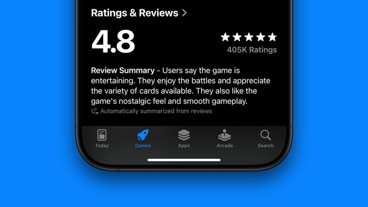Apple on Monday posted an update to its App Store Review Guidelines that, among other things, prohibits developers of PC mirroring apps from displaying a "store-like interface" and including the ability to purchase apps, specifications that appears to target PC streaming services like Steam.
According to Apple's revamped guidelines, apps that mirror specific software or services are not allowed to sport a UI that resembles an "iOS or App Store view," nor can the app provide mechanisms to "browse, select, or purchase software not already owned or licensed by the user."
The new rules come on the heels of Apple's rejection of Steam Link, a hotly anticipated title that allows users to stream games from a PC or Mac to iOS-based devices. Valve, developers of Steam, said the title was initially approved by Apple, but was ultimately revoked for "business conflicts with app guidelines."
Apple SVP of Worldwide Marketing Phil Schiller in a subsequent statement suggested Steam Link's provisions to purchase content were in violation of App Store regulations.
As of the latest update, Apple's App Store Review Guidelines specifically state multiplatform services "must not directly or indirectly target iOS users to use a purchasing method other than in-app purchase." Those apps, however, are now allowed to offer users access to content acquired elsewhere, so long as those same products are also presented as in-app purchases. The new rule opens the door for porting content over from Android, and potentially purchasing apps from third-party sources like the internet.
It seems Apple is looking to secure its 30 percent share (15 percent for subscriptions) of App Store purchases from would-be intruders like Steam, which on other platforms offers users the ability to buy in-game items.
Apple does, however, provide concessions for transactions made in a mirroring app that are processed on the host PC.
"For the sake of clarity, transactions taking place within mirrored software do not need to use in-app purchase, provided the transactions are processed on the host device," Apple's guidelines read.
In addition to mirroring services, Apple's guidelines now allow for free trials for non-subscription apps. In December, developers were granted the ability to offer discounted introductory pricing or limited-time free trials on auto-renewable subscriptions. The updated guidelines cover those apps as well, saying titles that attempt to "trick" users into subscribing under false pretenses or conducting bait-and-switch schemes will be pulled from the storefront.
Apple also mentions cryptocurrencies in its guidelines, noting both wallets and exchanges are allowed on the store. Mining, however, is not allowed unless said activities are performed off device. Further, apps are unable to offer cryptocurrency as incentives for completing tasks such as downloading an app or posting to social networks.
The company says ads displayed in an app must be appropriate for that app's age rating, allow the user to view ad targeting information and must not use sensitive data to target users. They must also be straightforward advertisements, meaning they cannot manipulate or trick users into tapping on them.
Other additions involve Siri Shortcuts, a prohibition on urging users to change system settings, general data privacy provisions, app update handling and more.
 Mikey Campbell
Mikey Campbell







-m.jpg)






 Malcolm Owen
Malcolm Owen
 Mike Wuerthele
Mike Wuerthele
 Andrew Orr
Andrew Orr
 Andrew O'Hara
Andrew O'Hara

 William Gallagher
William Gallagher

 Christine McKee
Christine McKee




-m.jpg)


2 Comments
Makes sense, an app is supposed to be just that, one app. Not a window in to another app collection.